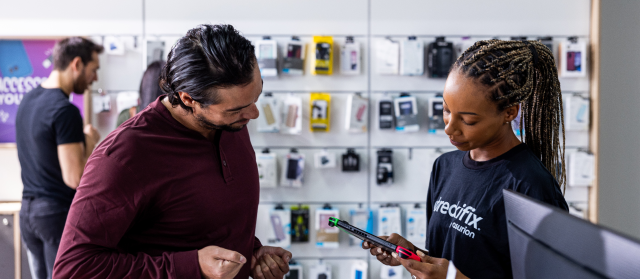Sluggish performance, unfamiliar sounds, and repetitive system crashes can be frustrating signs that your hard disk drive (HDD) may be on the brink of failure. Without quick action, you risk losing everything from cherished photos to essential work documents.
uBreakiFix® by Asurion has the know-how to tackle any tech problem. From battery replacements to fixing your computer’s function keys—we’ve got you covered. Check out what our experts have to say about overcoming hard disk drive failure on your Dell®.
What is a hard disk drive?
A hard disk drive is like a big file cabinet for your computer where all your files and programs get saved. It uses magnets to store everything digitally, so you can find and use your files whenever you need them. It’s an important part of your computer that could result in the loss of valuable data if it fails.
Why is my hard disk drive failing?
Hard disk drives fail for many reasons. Some common ones include overheating, unexpected power loss, natural wear and tear, and manufacturer defects.

You can’t work when your computer doesn’t want to
Get it repaired fast at one of our stores. Just stop in or make an appointment⎯we'll handle the rest.
Signs of Dell hard disk drive failure
Noticing odd behavior from your Dell computer could be a sign your hard disk drive is in trouble. Keep an eye out for these warning signs of failure so you can address the issue before you lose any data:
- Unusual noises
- Slow performance
- Frequent crashes
- Data corruption
Back up your data
Before attempting any fixes, you must back up your data to ensure you don't lose any important files. Consider using an external hard drive or a cloud-based storage service.
Fixes for Dell hard disk drive failure
Now that we've covered the common signs of Dell hard disk drive failure and completed a data backup, let's explore some fixes to help get your Dell computer back in top shape. Here are some troubleshooting steps you can take.
Run Dell Diagnostics
Dell provides built-in diagnostics tools that can help identify and possibly rectify disk errors. To run these diagnostics:
- Press and hold the Power button until your computer turns off. Then, wait 10 seconds.
- Press the Power button to turn your computer on again.
- When the Dell logo appears, tap F12 repeatedly until the One Time Boot Menu appears.
- Select Diagnostics, then wait for the test to complete.
A message will tell you whether your computer passed or failed the diagnostic test. If there is a problem, you’ll see a message telling you what hardware isn’t working correctly.
Update and reinstall drivers
Sometimes, the culprit behind hard disk drive issues isn't the hardware itself but outdated or faulty drivers. A hard disk driver helps your computer's operating system communicate with the hard disk drive.
Updating drivers can enhance your system's compatibility and functionality, potentially resolving any conflicts with your hard disk drive. If updating doesn't help, reinstalling the driver might be the solution. It can help remove any lingering issues related to driver installation and configuration. Try updating and reinstalling your Dell computer’s hard disk drivers with our dedicated guide.
Use CHKDSK to identify and fix errors
CHKDSK (check disk) is a built-in Windows™ tool that scans your hard disk drive for errors and rectifies them. It can help identify and repair logical file system errors, bad sectors, and other disk-related problems.
Depending on the number of files on your computer, the size of your hard drive, and the number of errors on it, this process could take hours to finish—so make sure you set aside a large window of time for this test. Be sure to back up your data before proceeding, and don't interrupt the process once it starts.
- Open File Explorer by clicking the file folder in the Taskbar.
- Select This PC on the left side of the window. Then, right-click the drive and select Properties > Tools.
- Click Check. In the open check disk window, check off both options to perform a complete check of the hard drive for errors.
- Click Start.
If you check a hard drive with open files, an error message will appear, stating that Windows can’t check the disk while it’s in use.
Replace the hard drive
If none of the previous steps help, consider replacing your hard disk drive. Hardware can fail due to prolonged use and wear, and sometimes, the most effective fix is simply to start fresh with a new drive.
If you’re uncomfortable replacing your Dell laptop’s hard disk drive yourself, bring it to an expert.
If you've tried these steps and still need a little help, we're right around the corner. Schedule a repair at the nearest uBreakiFix® by Asurion store and our certified experts can get your device back up and running as soon as the same day.

